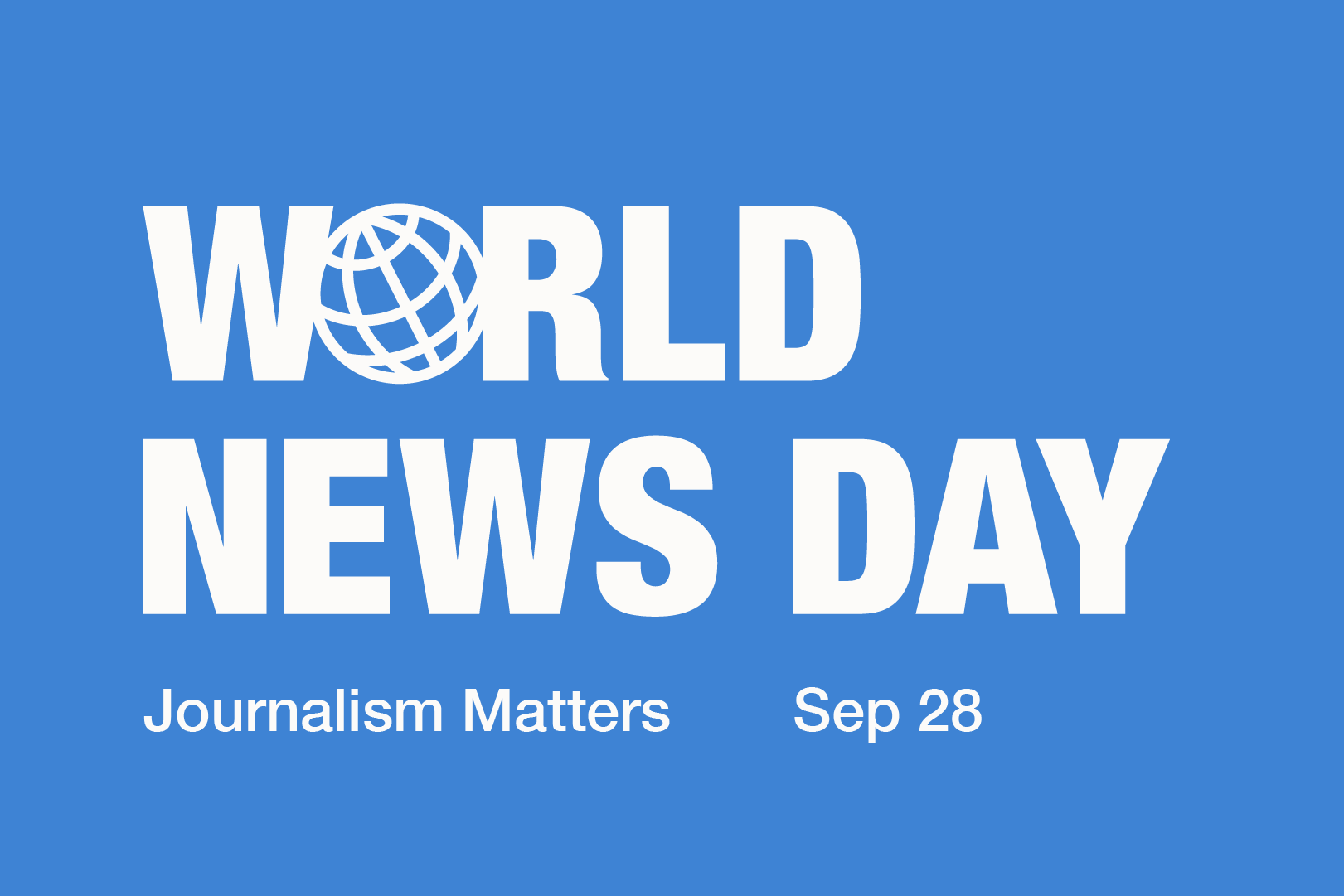
28 September 2022
“Journalism Makes a Difference” is the theme for World News Day 2022, held on 28 September.
World News Day 2022 comes at a time when journalism and its practitioners are facing increased pressures and threats, both from state and non-state actors. From media capture to journalist safety and the undermining of editorial independence, there are countless examples of journalism at risk.
Worse yet, these threats are happening when good journalism is needed more than ever. As we face the growing spread of online disinformation, the climate crisis, and the COVID-19 pandemic, audiences need access to independent, critical, and uninhibited journalism to underpin both their lives and the democratic life of society.
Fortunately, journalists around the world have demonstrated resilience and commitment to their work. Within public media organisations, we can see how public media journalism are lifelines during emergencies; tackle the spread of dis- and misinformation among young people; heal divisions in society; and so much more. In many countries, public media are the most trusted sources of news, even as more people are avoiding the news and trusting it less. Public media journalism is making a difference.
That is why the Public Media Alliance is proud to showcase a selection of news stories from our membership, submitted by the newsrooms themselves. Each story highlights a different issue (education, health, environmental threats, and others) but they each demonstrate good journalism – and why it is worth promoting and defending.
Ghana Broadcasting Corporation (GBC)
For the Ghana Broadcasting Corporation, its journalism makes a difference when it galvanises citizens to address societal issues. Most recently, a GBC news piece on the state of neglect at a rural primary school yielded positive results when philanthropists and a local bank were spurred to action.
Despite its constitutional commitments to Free Compulsory Universal Basic Education for all, Ghana’s reality on the ground is unfortunately different, with the disparity in accessing education most noticeable between rural and urban communities.
“Travelling across rural Ghana reveals a huge disparity in accessing education for the rural and urban child, who are expected to take the same national examinations at the basic level for advancement to high school,” GBC News Coordinator Peggy Ama Donkor explained. “The outcome [of this disparity] often has a disastrous ending of a vicious cycle of neglect and poverty […] so the aid makes a difference in the lives of the [students] in terms of enrolment and retention.”
Public Broadcasting Service (PBS)
By 2050 there will be more plastic than fish in the oceans. It’s an environmental crisis that’s been in the making for nearly 70 years. Plastic pollution is now considered one of the largest environmental threats facing humans and animals globally.
In “The Plastic Problem: PBS NewsHour Presents”, Amna Nawaz and her PBS NewsHour colleagues look at this now ubiquitous material and how it’s impacting the world, why it’s become so prevalent, what’s being done to mitigate its use, and what potential alternatives or solutions are out there. This hour-long program travels from Boston to Seattle, Costa Rica to Easter Island to bring the global scale of the problem to light.
CCN TV6
“Our audiences resonate not only with the English, Dutch and French speaking Caribbean diaspora but also includes our growing Venezuelan and Latin-American neighbours, many of whom migrated to our islands within the last few years. In recognising the gap in quality content for this massive community we have begun work to introduce their perspective, cover their stories, and highlight their needs along with our own.” – Seigonie Mohammed, Senior Multimedia Journalist & Presenter, CCN TV6
Days after Venezuelan nationals across Trinidad & Tobago mourned the loss of at least eight people who died while attempting to enter the country by boat, a CCN TV6 team visited the small community of Icacos to speak with a group of migrants. There, Venezuelan migrants recounted their stories of getting by, even as they asked for help to send their children to school.
Special Broadcasting Service (SBS)
“Come to us on any platform and you’ll find stories that give a voice to communities otherwise unheard, perspectives that break down barriers, entertainment and sporting moments that unite us, news that Australians turn to, and programs that are capturing the hearts and minds of people around the world.” – James Taylor, SBS Managing Director
In May 2022, Australian public broadcaster SBS launched its sixth free-to-air television channel. Its unique feature? It provides provide news bulletins in more than 35 languages. According to SBS Managing Director James Taylor, SBS in 2022 is “natively multilingual, digital-first, truly innovative, and trusted by a growing audience”.
SBS’s journalism makes a difference when it is reflective of Australia’s diversity. “Examining issues central to our Charter, we continue to uncover what it means to be Australian today. This year, impactful and powerful storytelling across SBS screens will continue to inspire, inform and emotionally connect with our audience,” Mr. Taylor said.
Medios Públicos Uruguay
How is Medios Públicos Uruguay’s journalism making an impact? By telling the stories that could mean the difference between life and death.
Camilo Delelli, Channel 5 News Journalist, explained: “The second Saturday of September marks World First Aid Day, a set of manoeuvres and techniques that can mean the difference between life and death. For Channel 5 news, we chose to send this material to publicize one of the works carried out by the Red Cross in Uruguay and because of the importance that first aid manoeuvres have in helping to save lives.”
Watch the full report in Spanish.
Caribbean Broadcasting Corporation (CBC)
“The hope is that by highlighting the positive plans of these youngsters, that journalism will serve as a conduit for others to follow suit.” – Mark Seale, Executive Producer, CBC
“Our story gave a voice to the youth who are trying to help solve a local problem of food security. Indeed, it’s a global problem,” Mark Seales, Executive Producer at CBC said. He continued, “Barbados has been tackling the uncertainty of food security even before the ongoing war in Ukraine, and these teenagers at one of our tertiary schools – The Barbados Community College – are planning to do their part. Students Liam Padmore, Teana Hurley, and Zahra Holder spoke with CBC reporter Sharika Griffith on their interest in agriculture.”
About World News Day 2022
World News Day is a global campaign – organised by The Canadian Journalism Foundation (CJF) and WAN-IFRA’s World Editors Forum (WEF) – to amplify the power and impact of fact-based journalism. This year, the Public Media Alliance is a supporting organisation.
World News Day 2022 is an opportunity for newsrooms to highlight the impact of their journalism on a global stage. Together, we’ll drive home the message that Journalism Makes a Difference and is worth promoting and defending.
Related Posts
5th September 2022
Celebrate 100 years of public service media with us!
PMA will be celebrating the 100th…

